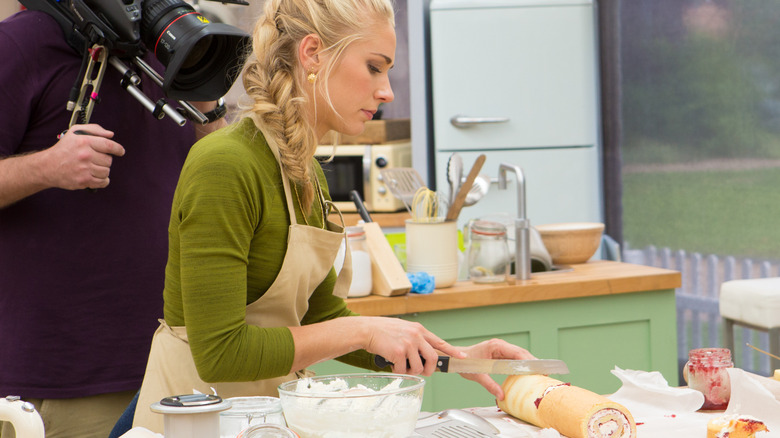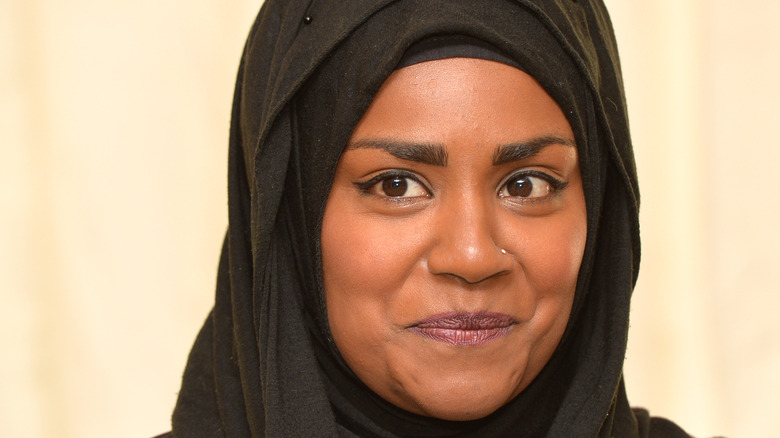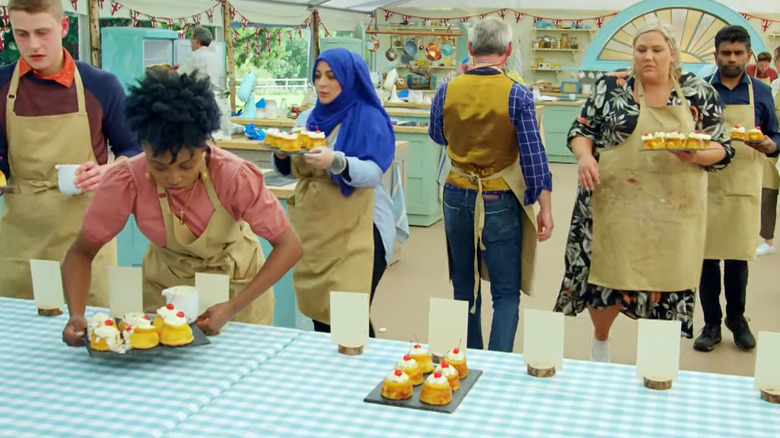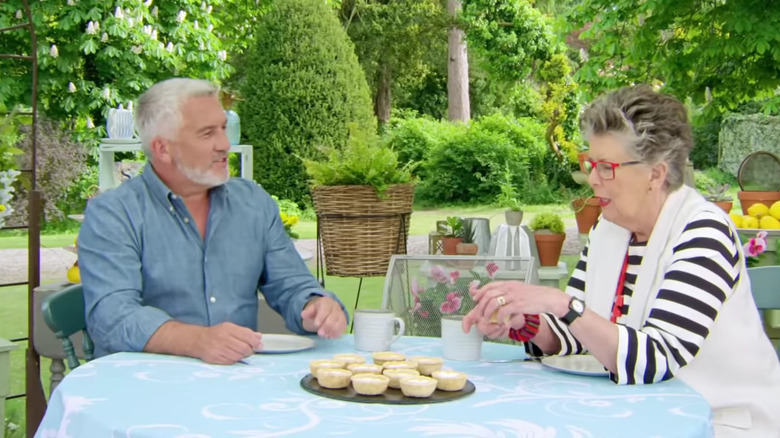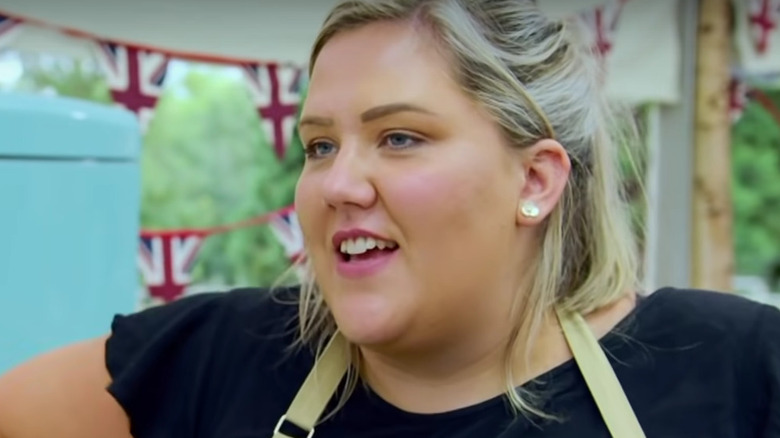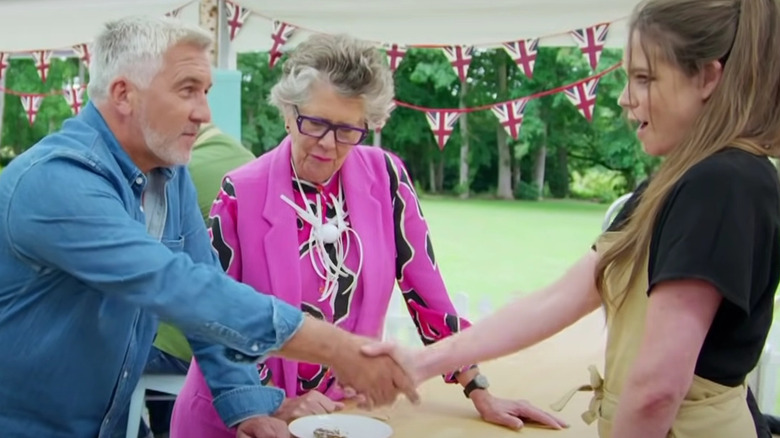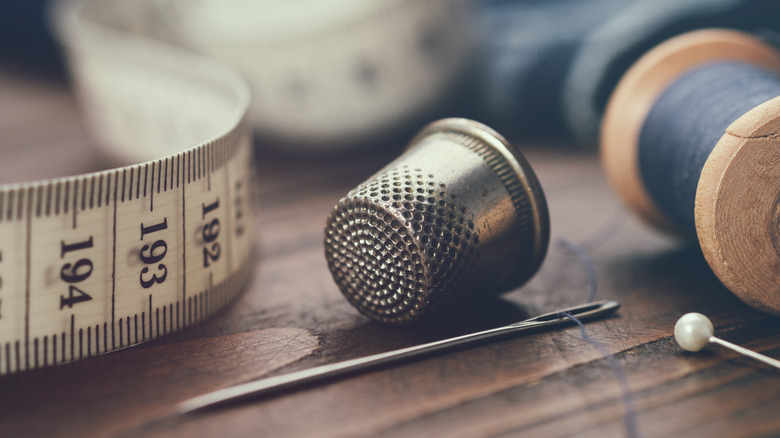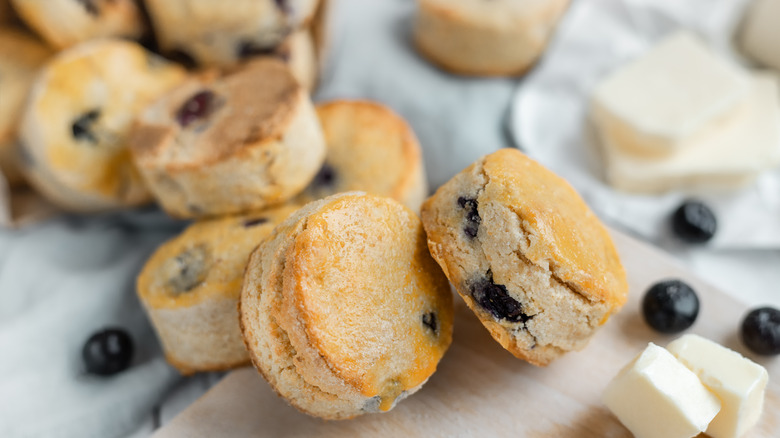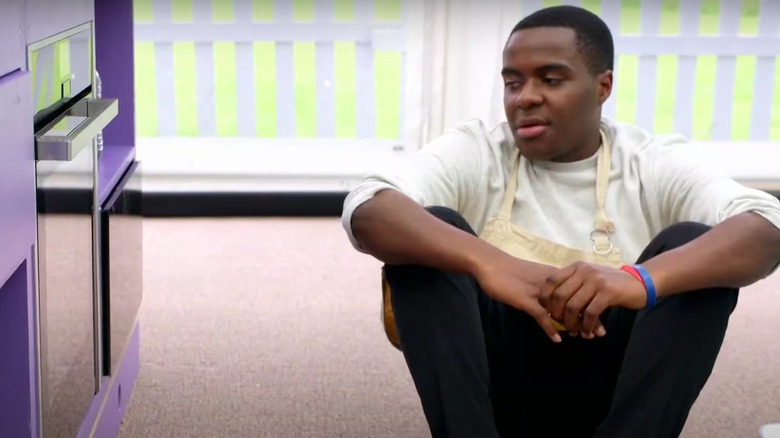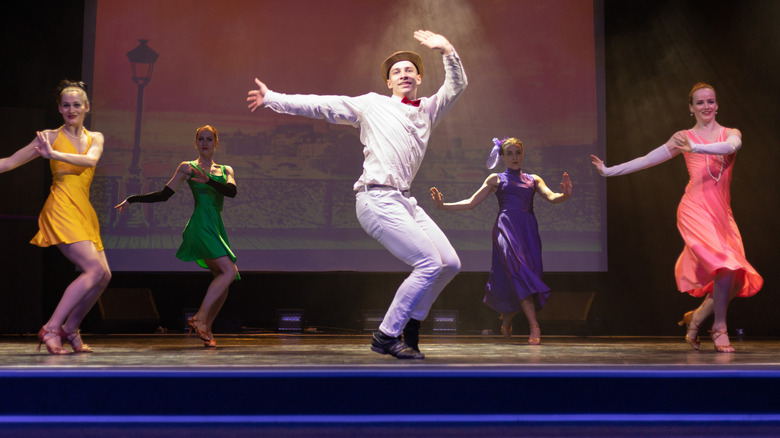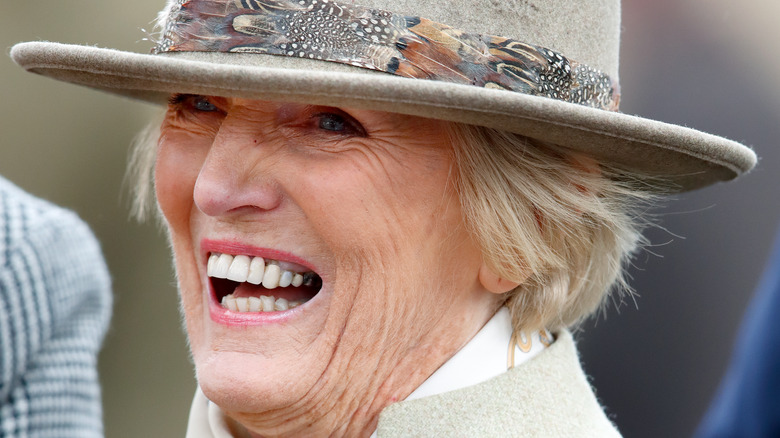What The Cameras Don't Show You On Great British Bake Off
Fuelled in equal measure by Paul Hollywood's icy blue gaze, and the heart-stopping thrills that accompany every challenge, "The Great British Bake Off" (known as "The Great British Baking Show" for those stateside) has become an international phenomenon. Throughout the past 12 seasons, viewers have been privy to a gripping and wide-ranging array of tent-based drama, from the dark cloud of Bingate, which still haunts the British psyche today, to more pleasant moments, like the stunning BLT Illusion cake baked by Season 8's Stephen Carter-Bailey. When revisiting iconic moments like these, it is little wonder that "The Bake Off" has captivated many throughout the world.
However, with a typical episode consisting of two, 16-hour days of shooting and the final program only lasting an hour there is a whole host of content that never makes it to our screens. Backstage dramas, production tribulations, and even national economic reactions all ripple out from the cultural behemoth that is "The Great British Bake Off." And now, these secrets, which have taken place away from the camera's penetrating gaze, are revealed in full.
The Great British Bake Off can change your life forever
Overnight fame is as integral to "The Great British Bake Off, as flour, eggs, and soggy bottoms. Picking a favorite and rooting for them to survive the tribulations of bread week whilst under the taught white canopy of the "Bake Off" tent is part of what makes the show so enjoyable. Fortunately, the arduous audition process, which we'll cover later, ensures that the final 12 contestants are capable of coping with the sudden global attention, primarily through a meeting with the show's psychologist prior to filming.
Yet, for some, the spotlight does not fade with time. In fact, for these (un)lucky few, the glare only intensifies. Nadiya Hussain is one such contestant. Labeled the "nation's sweetheart" by Public, Hussain has given a masterclass in how to use a cooking show to permanently change your life. She had the best start possible, winning Season 6 in impressive fashion. After her victory, she wasted no time in returning to the television screen, hosting a two-part travelogue titled "The Chronicles of Nadiya" on BBC One. Now, with her sixth cookbook on the way, and a monthly column in The Times, Hussain has solidified her place amongst Britain's culinary superstars, even making a cake for the Queen's 90th birthday (via BBC).
With an MBE for services to broadcasting and the culinary arts to her name, Hussain shows no sign of slowing down, and remains a near-permanent fixture on TV screens throughout Britain and beyond.
Bake Off influences British supermarket sales significantly
How many times have you watched "Bake Off," and then instantly ran to the shops to stock your cupboards full of ingredients you had never previously heard of? If the answer is frequently, rest assured that you do not stand alone. "The Bake Off Effect," a term coined to describe the sudden surge in sales of products used on the show, has firmly taken root in Britain. As reported by The Express, the 2015 season alone caused a 33% leap in sales of salted caramel sauce, a 180% spike for Peruvian goldenberries, and a 300% increase in the sales of crystallized ginger.
Whilst a boost in baking essentials such as flour and cooking chocolate is a common feature with each season, the surge in niche ingredients is much harder to predict. And as supermarkets get no warning as to what ingredients are going to be used in the upcoming season, many are left scrambling to stock up on previously unknown, and unstocked items.
Morrison's, evaluated as the fourth largest supermarket in the U.K. by Statista, takes "The Bake Off Effect" so seriously that in 2016 they appointed Anastasia Duncanson as Bake Off Officer. As reported by The Grocer, Duncanson is in charge of monitoring the show for "buying trends."
After being appointed to the position Duncanson labeled it as "an absolute dream job" (via The Scotsman) and after getting paid to watch "Bake Off," who can blame her?
The audition process is arduous
We wouldn't be human if we didn't occasionally imagine ourselves striding confidently into the "Bake Off" tent, maybe high-fiving host Noel Fielding on the way. But realizing this dream is not as simple as you may think.
As stated by Season 8 finalist Steven Carter-Bailey to Mashed, the application process consists of "constant questions, interviews, questions, interviews, credit checks, police checks, health checks, psychiatric checks, ability checks. You're constantly going down in front of cameras, [getting] checked for stress levels. "Even those who perform best under pressure, like Season 8 winner and Afghanistan veteran Sophie Faldo, concur. She told Vulture the audition process was "quite exhausting. It takes months."
As reported by Tellymix, the audition process for "The Great British Bake Off" 2022 involved a set of strict rules. For example, contestants could not make their living as a professional baker, chef, or cook and could not have acquired a cooking qualification within the 10 years prior to their application.
Even after meeting these requirements and completing a long application form, contestants still have a phone interview to look forward to before being invited to London for further interviews and a screen test. Applicants are obligated to bring some of their own bakes for this visit and to top this stressful experience off, all prospective contestants have to foot the bill for their audition level bakes!
Representation is an essential part of The Great British Bake Off
"Bake Off" is just as much about the people as it is about the cakes, and this fact has not been lost on the production team. Throughout the show's 12 seasons contestants of all ages, professions, body types, sexualities, and ethnicities have been represented.
Ex-contestant Michael Chakreverty highlighted in The Metro how the show's diversity represents Britain's cultural reality and paid homage to the fact that the producers do not focus on the sob story rhetoric which has defined other British reality TV programmes such as "The X Factor." The most evident examples of this being 2018 semi-finalist Briony Williams, whose limb difference was given so little focus by the production team that many viewers didn't even notice it until after the third episode, as reported by The BBC.
The show has also come to represent a modern, ethnically diverse British population which has been used as a counter to the anti-immigration rhetoric during a period of years that saw U.K. immigration rules more than double in length (via The Guardian). Global Citizen has highlighted the importance that the show's inclusion of all British identities brings, stating that it helps "shine a light on the positive impact of migration."
Paul Hollywood and Prue Leith do not bake the technical challenge examples
The sight of Paul Hollywood and Prue Leith sitting around the table with a perfectly formed, impeccably baked technical challenge in front of them is the endearing image of "The Great British Bake Off." Despite viewers being led to believe otherwise, the judges do not take turns baking the masterpieces themselves. On the contrary, as reported by Surrey Live, the judges never bake the example themselves.
It all boils down to timing, with shooting days being so long and the judges' efforts required elsewhere it doesn't make sense to have them working in a kitchen for hours (despite how much we all want to see their skills). Ironically though, both judges and hosts have been known to find the time to watch TV together.
Instead, the baking is done by the show's home economics team, whose ability is readily apparent for all who watch the show; picture perfect bakes looking, as Prue would say, neat as a pin. Unfortunately, they also get stuck with more mundane tasks which include cooking Paul Hollywood's breakfast and reviewing all the contestants' planned signature and showstopper recipes. They also must source all the necessary ingredients and equipment. Faenia Moore, who has worked on "Bake Off" since its inception, told the LA Times she begins sourcing ingredients up to two months before the show starts, and admits blithely that when working on the show she has "a million lists."
Fans have been known to bully contestants
"Bake Off" is built upon a competitive but above all friendly, environment. Bunting flaps in the wind, contestants hug and support each other, whilst hosts have been known to cry when their new friends are voted off the show. In short, "GBBO" is a testament to the undeniable power of decency in stressful situations.
Unfortunately, the goodwill epitomized by all on the show is not always reflected by those watching. Bullying of the contestants on social media by so-called fans is a depressingly familiar stain on "GBBO's" otherwise pristine, gingham tablecloth. The most infamous incident was undoubtedly the bullying of contestant Laura Adlington who made the final in 2020, piping fan favorite Hermine to the highly contested last spot.
Hermine, who leaped to the defense of Adlington on Instagram, implored people to not "be unkind in my name" whilst Paul Hollywood in his own post labeled the behavior "disgusting." Alas, the trolling shows no sign of abating with 2021 contestant George Aristidou branding some of the messages he received during his time on the show as "hateful."
The Bake Off bubble was quite the party
When COVID-19 hit, whether "Bake Off" would be canceled or not was the least of most people's worries. However, when it was announced that the show would go ahead after the creation of a bubble system that saw all staff and contestants isolated together for six weeks at Down Hall Hotel Essex, the nation rejoiced. It was, as stated by The Independent, a much-needed "feel-good hour of cake and companionship." There was an opportunity for some sort of normality to reign, and many saw the cast and crew as heroes for putting up with the bubble to deliver a "Bake Off" similar to the one we all know and love.
However, the bubble was not all as mundane and self-sacrificial as one may initially have thought. Indeed, both presenters Noel Fielding and Matt Lucas hosted events (an indie festival and quiz night respectively), whilst all staff including Hollywood and Leith were, as reported by The Daily Mail, at the hotel bar often.
The scope of activities enjoyed, when coupled with the contestant's increased on-camera camaraderie noted by Hollywood to The Scotsman, would lead us to suggest that the crew, cast, and eventual show actually benefited from the lockdown strategy, as opposed to being hindered by it.
Paul Hollywood has struggled to keep a grip of the Hollywood Handshake
After being introduced in Season 3 the Hollywood Handshake has become something of a cultural phenomenon. Often preceded by some mindful chewing and a thoughtful look at the ground, the outstretched robust hand signals a contestant's bake has neared absolute perfection, and that one of their "Bake Off" fantasies has been fulfilled.
The famed gesture has become an ever more frequent occurrence, with 12 being given in Season 9 alone, (as reported by dedicated website hollywoodhandshakes.com). After dialling it back in subsequent seasons (Season's 10 and 11, only had four and three handshakes respectively), Hollywood's pudgy digits once again caused outrage in Season 12 after he doled out three in one signature challenge!
As per The Sun, Paul himself admits he has given out too many, suggesting he may even scrap this iconic gesture in future seasons. Some have suggested this would lend more balance to the show, as his fellow hosts have never had a gesture to equal the handshake. However, prospective contestants will surely be devastated to lose the opportunity of achieving physical affirmation of their good work. So, maybe to soothe both parties it is time for another gesture to take the handshake's place; The Prue Leith pat-on-the-head, anyone?
Bake Off provided the template for a slew of new shows
With The Media Leader calculating that the 2021 season finale drew an audience of over 7 million viewers it is not hard to see why the famed baking show has inspired the BBC to launch many other "rustic hobby" television programs. Most of these shows follow a similar format wherein several amateur enthusiasts battle through a range of challenges, with one person being eliminated each week, until a champion is crowned. However, despite sticking to a tried and tested formula, the broadcasting company's endeavors have been met with mixed results.
"The Great British Sewing Bee," which markets itself as "the ultimate sewing battle" has done reasonably well, receiving a boost of viewers in the shape of aspiring enthusiasts during the lockdown. Yet, the show has struggled to reach a wider audience due to the seeming less accessible challenges. As highlighted by The Guardian, it is one thing to bake a Victoria Sponge, and quite another to attempt to sew a whole outfit.
Unfortunately, another of the BBC's "Bake Off"- inspired gambits, fared much worse than "Sewing Bee." Another show, "The Great Pottery Throwdown," which sought to ignite a national passion for pottery making, really struggled to capture that "Bake Off" magic and was axed in 2018.
Producer Anna Beattie fought for years to get the show aired
"Bake Off's" rip-roaring success is now so all-encompassing that it is hard to imagine anyone doubting its ability to thrive on the small screen. But it has recently become apparent that there are many who did. Anna Beattie, who came up with the original idea behind "The Great British Bake Off," pitched the show for a whole four years until the show was accepted (with the help of a batch of scones) by Janice Hadlow, who was at that time the controller at BBC Two.
What was the inspiration behind the show? Beattie's friend reportedly told her about "bake off's" in the U.S., and Beattie decided to match this competitive structure with the British pomp and niceties of a village fête. The killer combination of judges Mary Berry and Paul Hollywood, who couldn't believe his luck when he got the callback, were then added. Swiftly followed by original hosting duo Sue Perkins and Mel Giedroyc. According to comments made by Hollywood in The Daily Mail, the quartet were all shocked by the show's meteoric rise. For Beattie, it must have seemed like all those long years pitching had finally paid off.
The action is (for the most part) real
If you think that being a contestant on the show is difficult, then please spare a thought for the production team who have the herculean task of capturing the frantic action of 12 very stressed bakers. Even with multiple cameras in the tent and every contestant mic'd the production team is bound to miss a few things. But they have a few strategies in place to mitigate these losses and ensure that key moments are not the ones being missed. First and foremost amongst these is a rule that states all contestants must signal a camera to capture the moment a bake is put in the oven and the moment it's taken out. This is why you so often hear a contestant utter the famous line "I'm going in."
However, despite the crew's best efforts, not everything can be captured in real-time. Ex-contestant Ali Imdad revealed that when lines are fluffed by the judges, or minor actions like whisking are missed, the production team asks them to do it again. This type of tweaking is commonplace in nearly all cooking shows. For example, Mashed revealed that the food presented to judges in "MasterChef UK" is often served cold. However, like "MasterChef," "Bake Off" does not lose its reality TV status because, as stated by The SAGE Encyclopaedia of Communication Research Methods, the show remains unscripted.
The show has inspired many spin-offs (including a musical)
"Great British Bake Off" mania is everywhere, leading to a variety of spinoffs being produced. The most beloved of these is "The Great Celebrity Bake Off," which involves various celebrities competing across the usual challenges with the goal of raising money for charity. To date, the supported causes have been Sport Relief, Comic Relief, and most recently Stand Up To Cancer. However, despite its respected, charitable endeavors the show will perhaps always be best known for televising James Acaster's existential crisis as he attempted baking for the very first time.
"Junior Bake Off," a children's version, for aspiring bakers aged 9-12 debuted on CBBC back in 2011 with former "Bake Off" contestant Liam Charles forming one-half of the hosting partnership. However, it is the latest addition to the "Great British Bake Off" empire, which is definitely the most daring yet. "The Great British Bake Off: The Musical" is a new theatre production which will chart the journeys of multiple bakers as they vie for baking's top prize. Launching at the Everyman Theatre in Cheltenham on July 22, 2022, the show hopes to imitate the success of other food-related musicals such as "Waitress," which was nominated for best musical in the 2016 Tony Awards.
The show's liberal use of innuendo has won it many fans and critics
From soggy bottoms to hot buns, innuendo has been a part of "Bake Off" since its inception. Not only is it a vital part of what makes the show work according to Martin Rowson of the Guardian, but also a reflection of British "banter" society as a whole. Paul Hollywood agrees, defending the myriad of jokes by stating that "[British] culture has always been based off it. Carry on films did it for 30 years ... it's in our DNA to giggle at ourselves." And giggle at themselves they certainly do, a recent comment made by Prue Leith left Hollywood in stitches, demonstrating that the newer members of the show are more than happy to uphold "GBBO's" racy tradition.
Yet, for some viewers, these jokes are far from funny, with a few suggesting that in recent seasons "GBBO" has become far too smutty. It is true that there were 15 official complaints related to Matt Lucas' recent euphemisms. However, this number pales in comparison to the amount received when fan favorite Jürgen was booted off the show in last year's semi-final, suggesting that for the majority of the public, it's the judging and not the joking, that gets the blood pressure rising.
